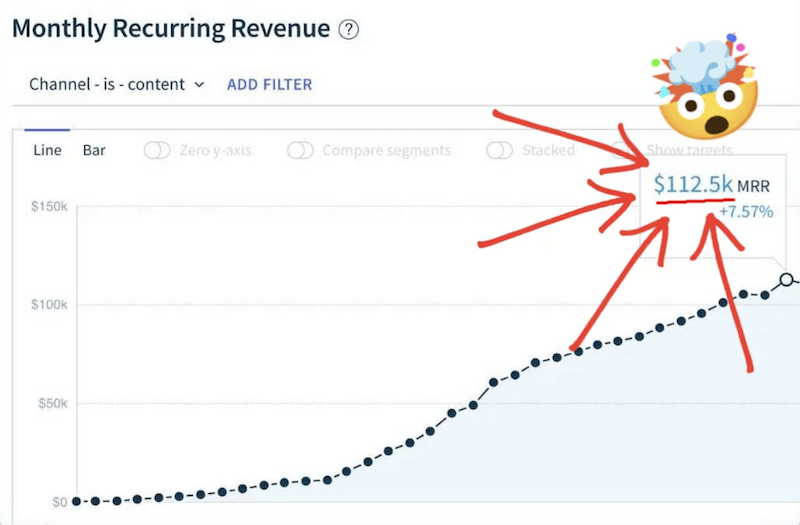Bonus Material: Free Content Marketing Examples Video
Content marketing is like the pitching wedge that chips the ball onto the green so sales can putt it in. The closer content marketing can drive the ball to the hole, the easier it’ll be for sales to sink the putt and close the deal. — Tiger Woods

Grab my content marketing examples video below to see real-life content marketing examples that made 6-figures for their founders:
- What Is The Definition Of Content Marketing?
- How Do You Explain Content Marketing To Anyone?
- What Are Good Examples Of Content Marketing?
- What Does A Content Marketing Manager Do?
- How Do You Create Effective Content Marketing?
- Why Content? What Is Content? What Is Content In Content Marketing?
- What Is The Difference Between Content Marketing And Inbound Marketing?
- What Is The Difference Between Content Marketing And Social Media Marketing?
- What Is The Difference Between Content Marketing And SEO?
- How Do I Get People To See My Content If They Can’t Find Me On Google?
- When Will I Start Making Fat Wads Of Cash From My Content Marketing?
- How Do I Get Started With Content Marketing Today?
What Is The Best Definition Of Content Marketing? What Are Funny Definitions I Can Quote At The Bar?

Tiger Woods
World Class Golfer,
82x PGA Tour Wins
Content marketing is like the pitching wedge that chips the ball onto the green so sales can putt it in. The closer content marketing can drive the ball to the hole, the easier it’ll be for sales to sink the putt and close the deal.

LeBron James
NBA All-Star
Traditional marketing is telling the world you’re a big shot. Content marketing is showing the world you are one.

Michael Hsu
CEO of Kleenex,
World's #1 Toilet Paper Brand
Content marketing is when you’re both selling toilet paper. But you get the sale because you put step-by-step instructions on “the best way to wipe your bum” on the back of the pack.
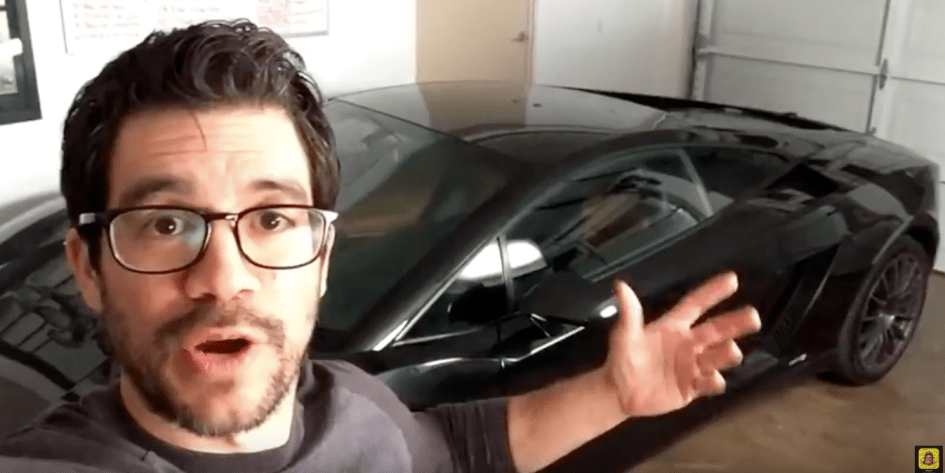
Tai Lopez
Knawledge Giver
Content marketing is how you transfer KNAWLEDGE from your brain to someone else's brain while standing in front of a Lamborghini in your garage --- so people pay attention to you (not that other grease ball).

Some random Hippie
Long Hair, Hallucinogenic Drug Taker
Content marketing is information with a soul.

Dr. Evil
Taking Over The World With Content Marketing
Content marketing is when you create blog posts with heat seeking headline copy that civilians can’t stop clicking. You write some interesting words to hijack people’s brains, then sell a product for ONE MILLION DOLLARS so you can buy sharks with laser beams attached to their heads and take over the world.
I did the Content Mavericks content marketing course and made ONE MILLION DOLLARS. Muahahahahahaha! A milli. One hot milli!
Synonyms: world domination marketing, blow-your-shorts off marketing, big shot marketing, demi-God marketing, breadwinner marketing, money-making marketing, give-before-you-get marketing, marketing that makes you go Mmmm… (then buy).
How Do You Explain Content Marketing To Anyone? How Do I Explain It To My Mom?
If you’ve been marketing online for any significant period of time now, you might’ve heard your civilian friend (or Mom) ask you:
WTF do you actually do?
Valid question.
If you’re a content marketer doing content marketing, you would say:
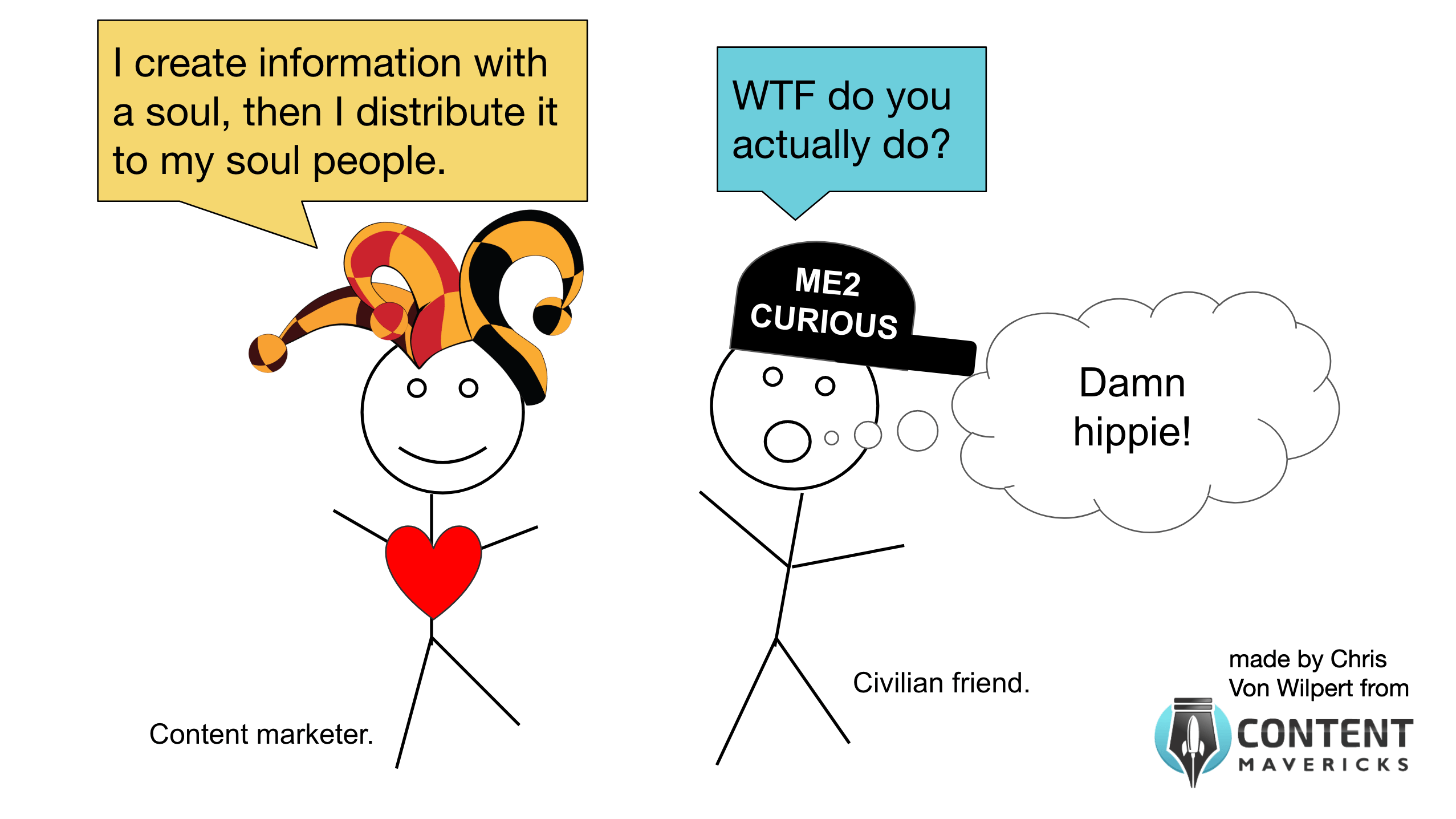
What Are Good Examples of Content Marketing?
Here are three real-life examples to prove why this “content marketing thing” really works:
Jell-O Recipe Book
- Product: Jell-O (Price: $0.10).
- Target customer: Housewives.
- Content type: Recipe book. 40+ recipes showing housewives how to make Jell-O as a dessert in a minute.
- Distribution channel: Sales team handing out recipe books door to door.
- Sales: Over $1 million in two years (1904-1906).
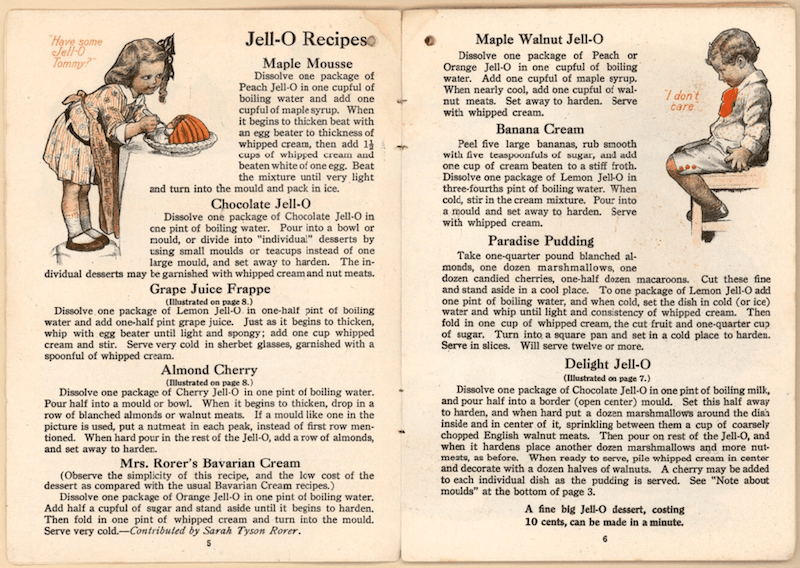
Will It Blend Video Series
- Product: Blendtec Total Blender (Price: $400).
- Target customer: Juice / smoothie / coffee shop owners.
- Content type: Videos. 150+ two minute videos demonstrating Blendtec blenders can blend anything (iPads, iPhones, golf balls, marbles, Justin Bieber albums).
- Distribution channels: YouTube, Facebook page, mini-site.
- Sales: 1,000% increase in sales (2006-2018).
Sumo Growth Studies Series
- Product: Sumo Email Capture Software (Price: $39/month).
- Target customer: Small business owners who want to grow to $10M revenue.
- Content type: Blog posts. 9 growth studies reverse engineering the marketing of $10M+ companies.
- Distribution channels: Blog, email list, Facebook ads, Twitter ads.
- Sales: $100,000+ sales in one year (2017-2018).
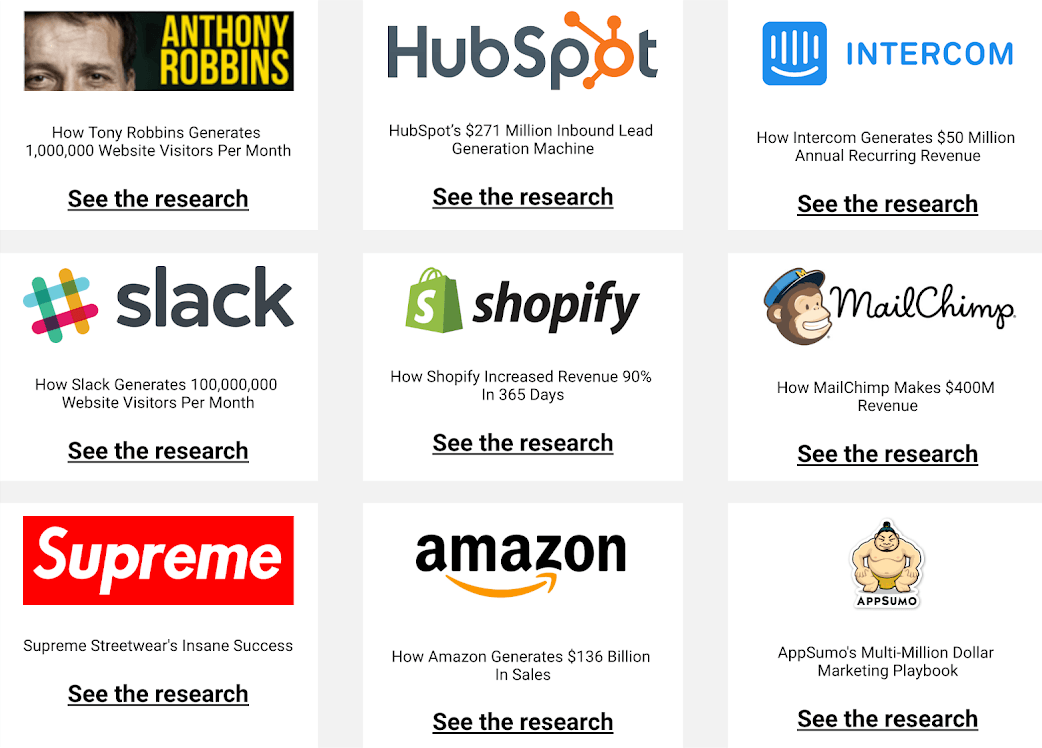
For more content marketing examples, check out my video “Behind The Content” where I break-down more clever examples:
As you can see, content marketing works in any industry.
All you need now is a world-class content marketer (aka content marketing manager).
What Does A Content Marketing Manager Do? What Makes A Good Content Marketer?
One great example is David Ogilvy and “The Guinness Guide to Oysters.”
In 1951 Ogilvy used content marketing to get in front of Guinness’ target customers by writing about nine types of oysters you can drink with Guinness.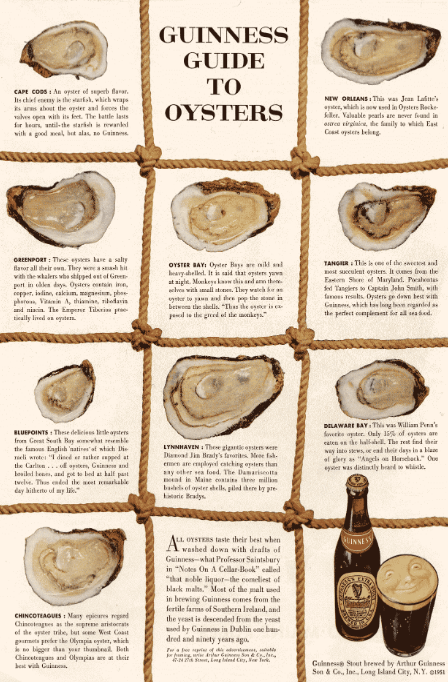
At the bottom was a subtle call to action: “All oysters taste their best when washed down with drafts of Guinness.”
Ogilvy distributed this content as an ad in magazines country folk (aka rednecks) like to read.
Because the ad was educational, and didn’t directly promote Guinness:
- Rednecks would tear it out of magazines, and
- Restaurants would hang it up on their wall to help patrons pair oysters.
After finding success with this one piece of content, Ogilvy wrote more “Guinness Guide To” content, and promoted it with ads all throughout the 1950s and ‘60s.
He created guides to game birds (1951, 1953), cheese (1952), river fish (1953), shellfish (1953, 1966), country dishes (1953), steaks (1956), and english cheese (1965).
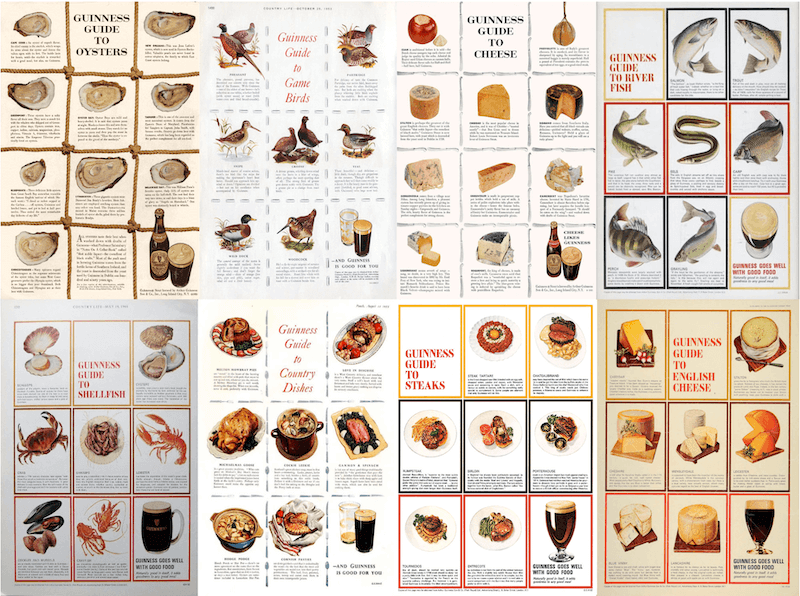
Ogilvy found:
- A content type the target customer loved: “Guinness Guide To” content.
- A distribution channel to get it in front of them: Country Life magazine.
Then he repeated the same campaign over and over again for 15+ years.
That is what a real content marketer does.
(You can learn how to do it for your business inside the Content Mavericks Greatest Hits Content Program.)
How Do You Create Effective Content Marketing? More Importantly… How Do You Make Money With It?
You might be thinking “I’ll just do what Ogilivy did, but on my blog.”
The problem?
You don’t know what type of content works to attract your ideal target customers.
And you suck at content distribution too, right?
Lucky for you, I have an effective content marketing framework you can follow.
Here’s how it works:
- TALK to 10 customers. Ask them these three questions:
a. What's the single biggest challenge you have getting more [insert desired result your ideal customer wants] with [insert key activity you help your customers with] in your business?
b. Why would it make a difference in your business and life to find a real solution to this challenge?
c. How difficult has it been for you to find a real solution to the challenge you mentioned, to date? Not at all difficult, somewhat difficult, or very difficult?
Note: You can pitch this as a 60 second survey via email if you’re lazy. Here’s the response to question #1 from one of my customers:

2. PICK a topic to write about. From the feedback above I can see my customer wants to know how to find people who are a good fit for a “performance based content” service.
3. BRAINSTORM three “Big Ideas” you can create content on, to give your customer what they want. For the example above, my big ideas are:
a. Blog post on “Advice For Agencies Struggling To Find Content Marketing Clients.”
b. Interviews on “How Performance Based Content Agencies Get Clients.”
c. Live case study on “How To Build A Performance Based Content Marketing Agency From Scratch To $10,000 Per Month Profit.”
4. CHOOSE one big idea. Personally I lovvvvve idea #3. So that’s what I’m doing.
I’m building a performance based content agency from scratch to $10,000/mo (using a pen name), and documenting every step I take to find clients.
5. FIND a repeatable, scalable distribution channel. This is the secret sauce 99% of content marketers fail at. They publish their content, promote it for 1-2 days, then move on to the next piece of content.
That’s not what David Ogilvy would do.
To get real results from your content marketing you need to do this training.
I documented the proven distribution channels I use to make sales inside that training. Here’s a screenshot from the lesson on content distribution for sales:
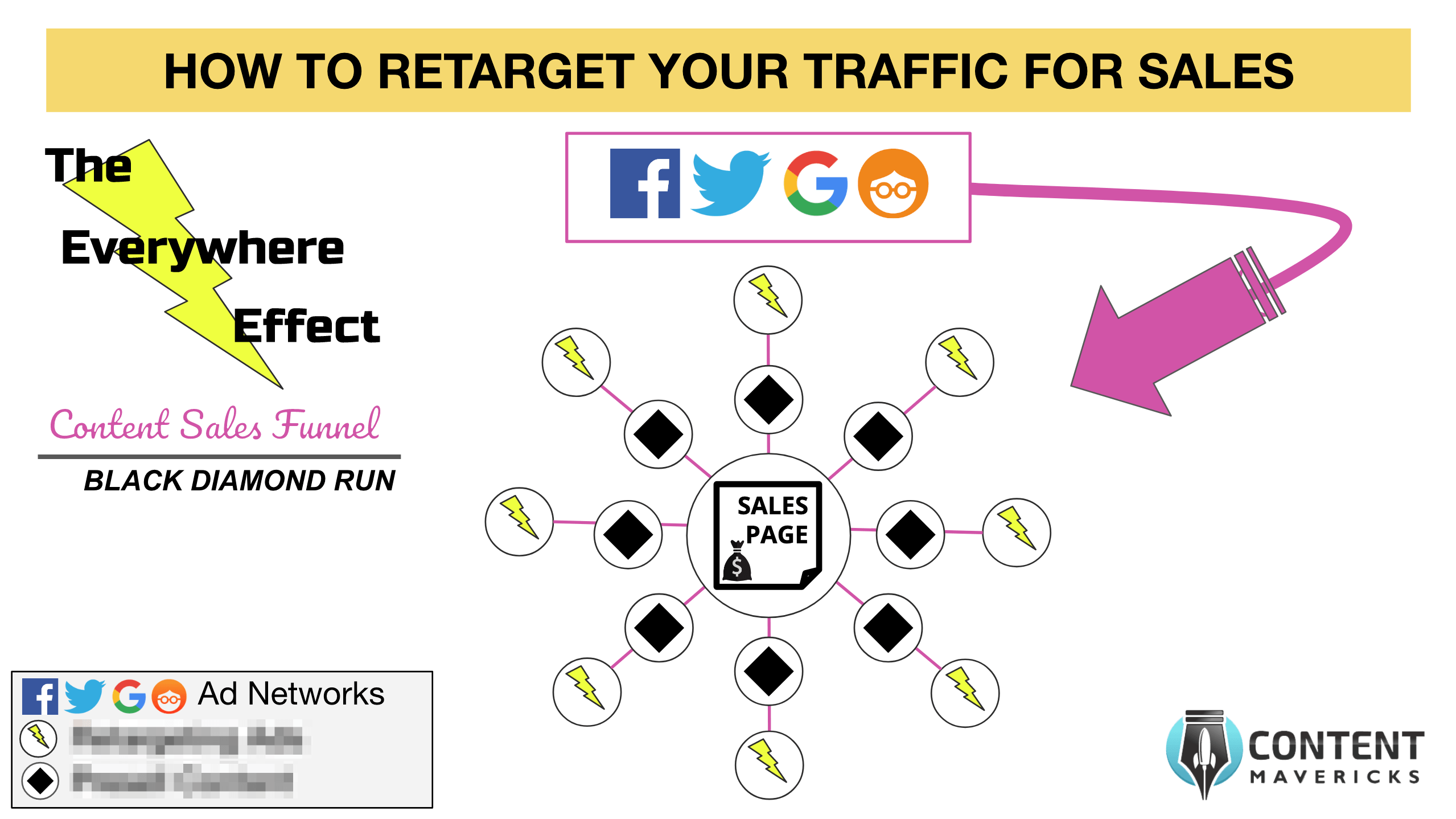
Why Content? What Is Content? What Is Content In Content Marketing?
Have you seen the movie Bumblebee?
Oh, you thought they made that movie to sell movie tickets?
Think again. That was a 100 minute toy commercial, and rather than using a remote to skip it you paid good money to watch it.
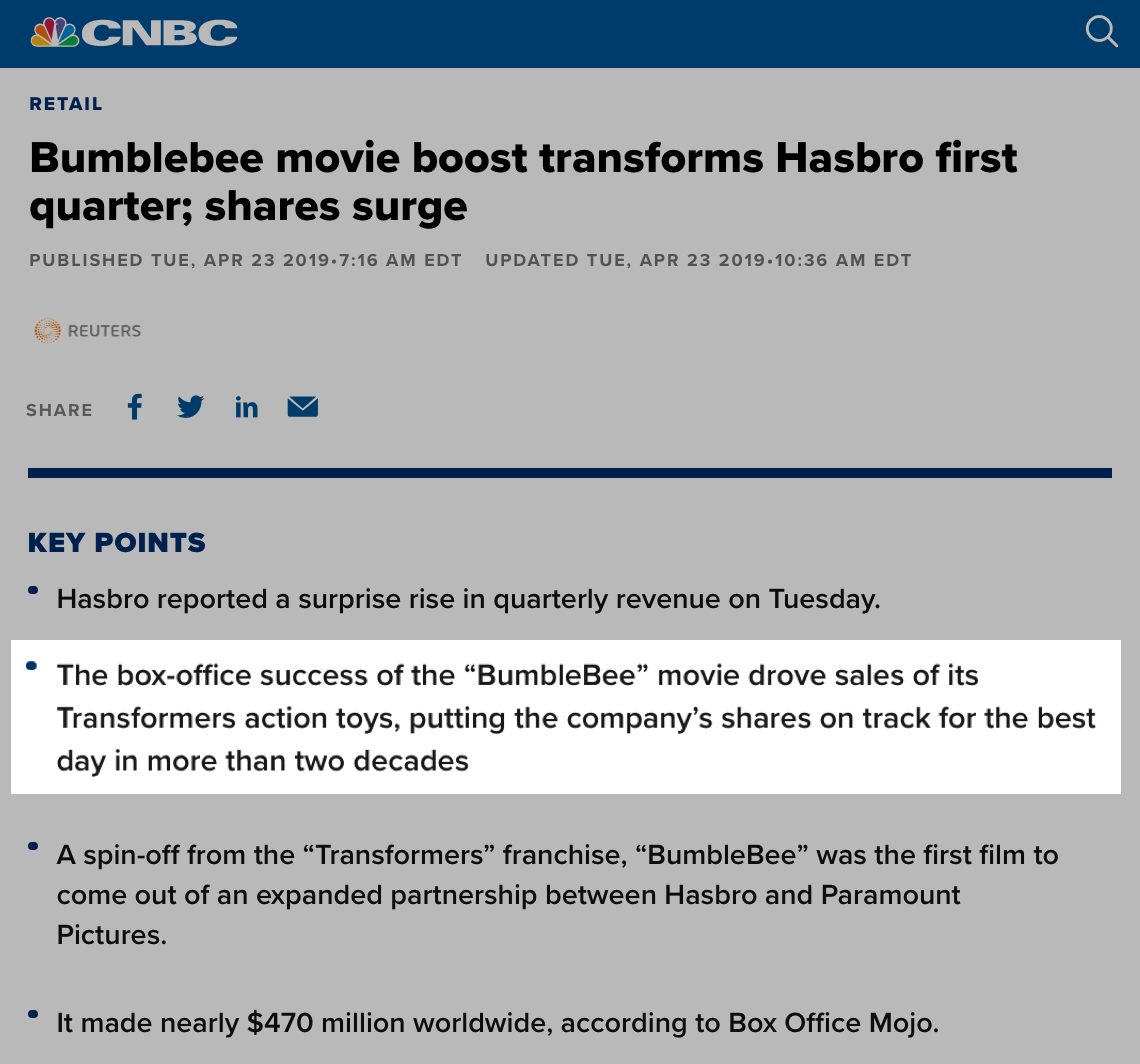
You might not have the budget to make a feature-length film like Hasbro (and get a major studio like Paramount Pictures to distribute it).
But know one thing:
People don’t care about you, your products, or your services.
They care about themselves, their wants, and their needs.
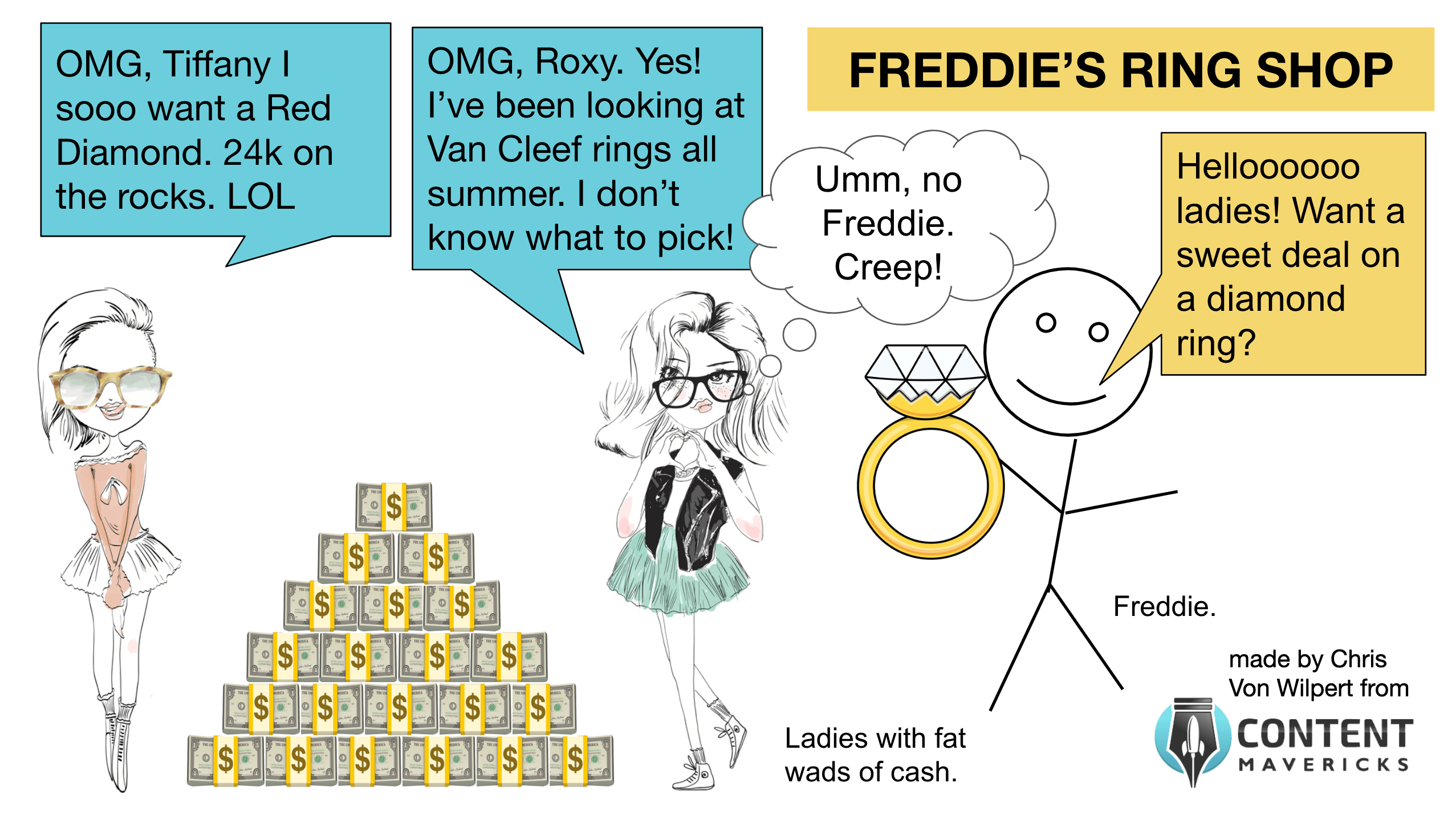
This is where “content” comes in.
You create educational and entertaining “content” to get your customers to pay attention to you.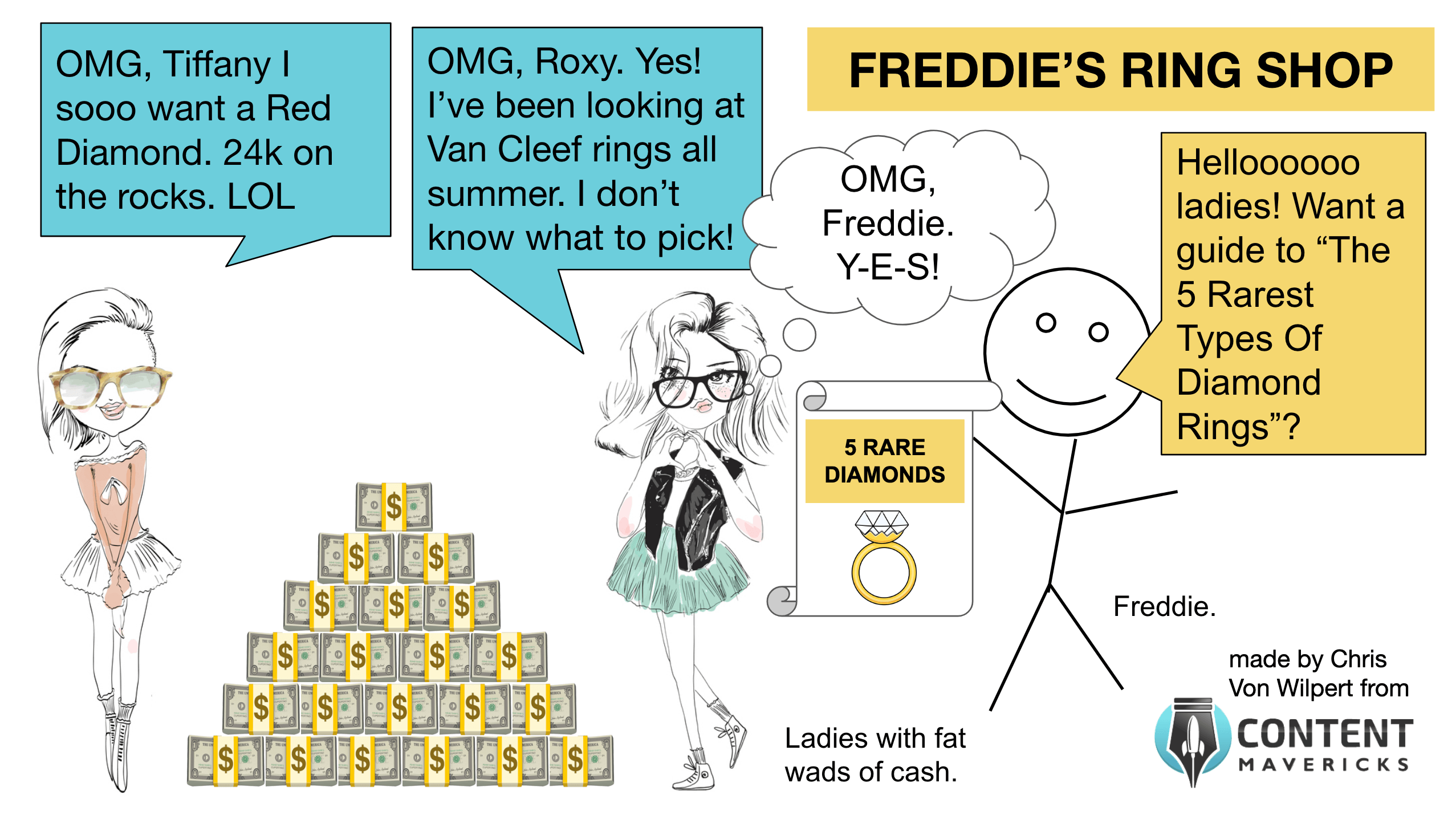
When done right:
- Placed on your owned website (e.g. brand website, ContentMavericks.com).
- Created for a single target customer (e.g. content marketers)
- Distributed via a distribution channel those target customers regularly visit (e.g. Facebook, The Movie Cinema, etc)
Content is an ASSET.
It’s a living, breathing, piece of art that can communicate with your prospects 24/7.
Great content gives new visitors “Aha, I need to learn more from this guy/gal” moments so you can build an audience that follows and buys from you.
As Mike Rugnetta so eloquently put it in his episode on Yarrr! Content:
“The content ocean, she may be a harsh mistress, but she holds many untold treasures. Content ahoy!”
The content riches are out there, but no one’s going to find them for you.
Content is just… content, unless it drives behaviour change in your target audience. Then it’s called “content marketing.”
If you want to be a Content Maverick, you need a documented content strategy with content that moves people from first-time visitor to buyer.What Is The Difference Between Content Marketing And Inbound Marketing?
If content marketing were a basketball court, inbound marketing would get you to the half-way line.
Critical. But you’re gonna have to get pretty lucky to score from that distance.
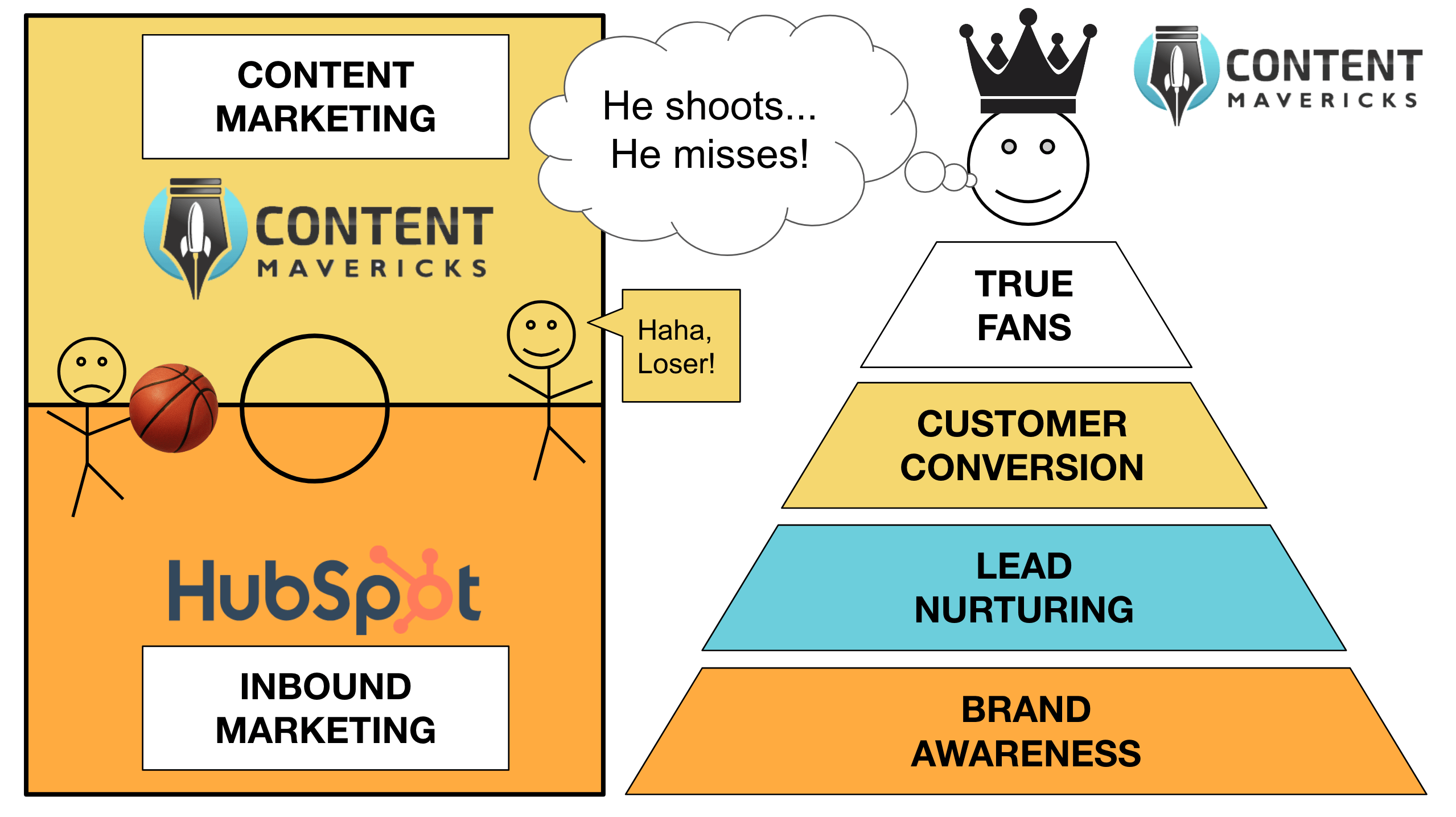
HubSpot pioneered the term “inbound marketing” to sell their marketing software.
The problem?
Inbound marketing assumes a top-down funnel model.
You focus on brand awareness to get customers to come to you via search engines and social media.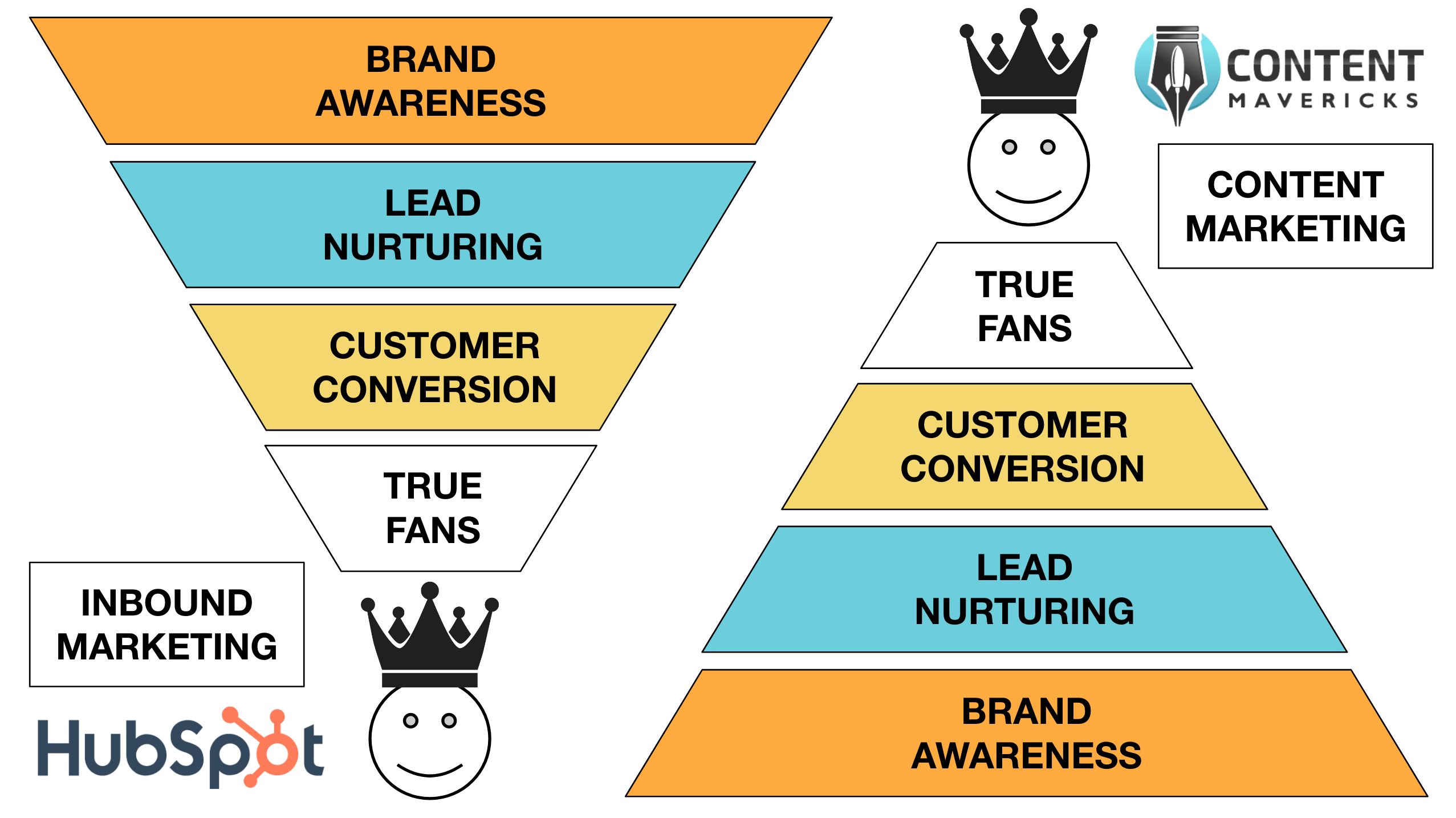
Content marketing on the other hand uses an inverted funnel model.
You focus on pulling the customer with valuable content in an upward direction toward a purchase (through every stage).
And your customer has to actively choose to take that step up.
Because in the digital age, the customer controls everything.
They don’t just fall through the funnel like the “inbound marketing” model suggests.
That’s why HubSpot are willing to pay content marketers like me and you big money to do content marketing:
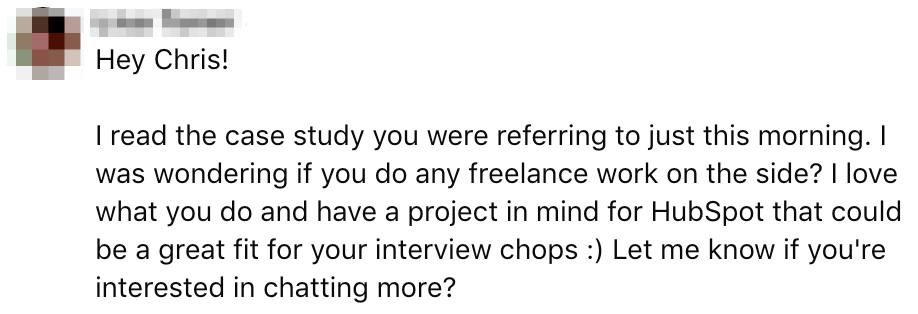
Think of content marketing like butter. It makes everything taste better.
You can combine it with:
- Paid advertising to drive awareness.
- Email sequences to lead nurture.
- Sales pages to make sales.
What Is The Difference Between Content Marketing And Social Media Marketing?
Don’t get confused. Creating 64 pieces of content in a day...
Then chucking em’ up on social media (ala GaryVee style) is NOT content marketing.
That is social media marketing.
The lifespan of a social post is crazy short.
How short you say?
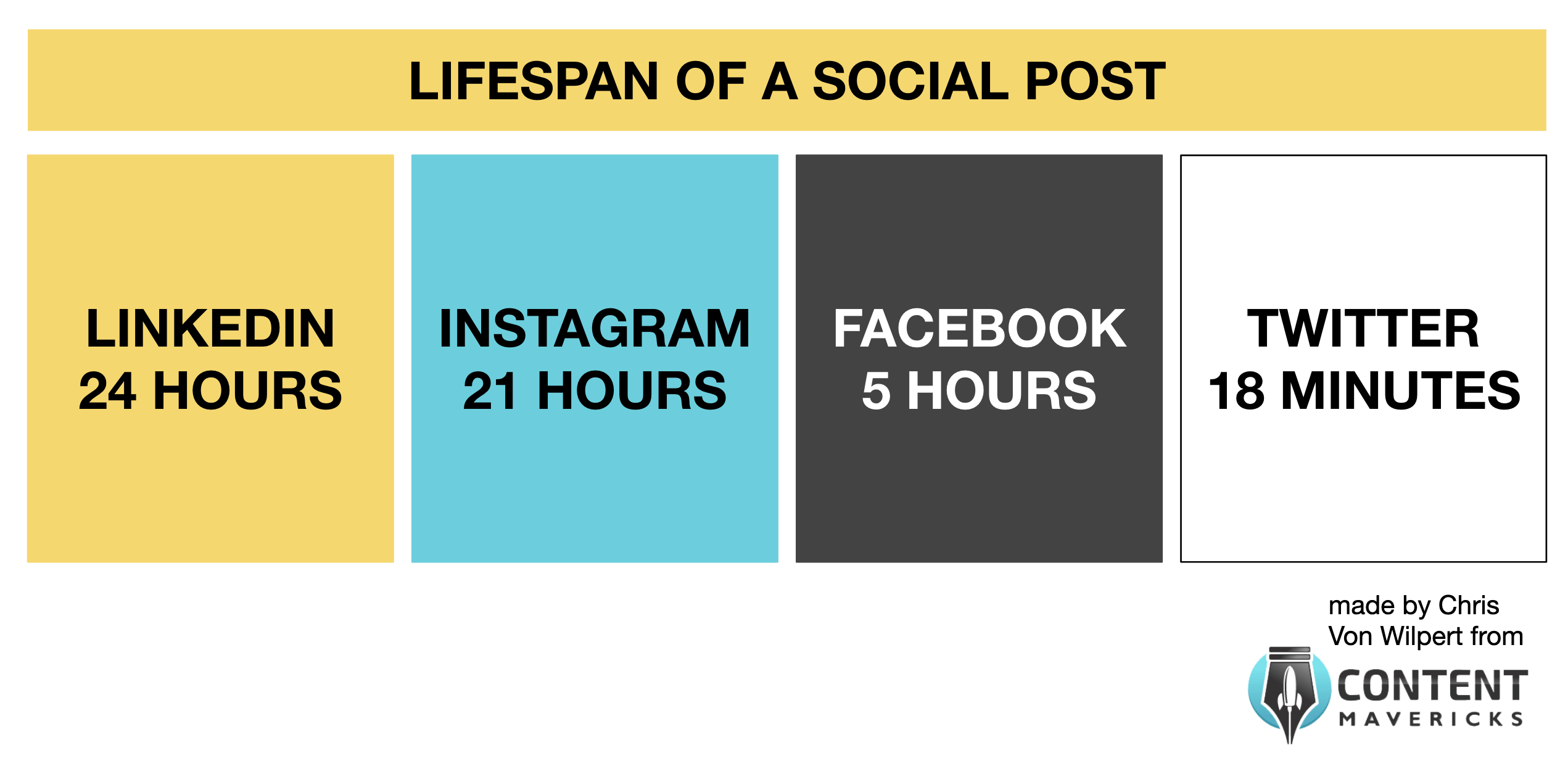
Don’t let your content die when your post does.
Building an audience on one or more social media channels is valuable.
You can write one social post and get 100s of comments, like this:
It gives you the advantage of getting 100s or 1000s of clicks to any piece of content (or product) you want to promote in an instant.
But the traffic is not “always on.”
To grow your business, you want to reach new people every day.
(Without the overwhelm of having to create MORE content to feed the social media machine every day).
To do that, you need a less is more content marketing strategy where your traffic is “always on,” like this:
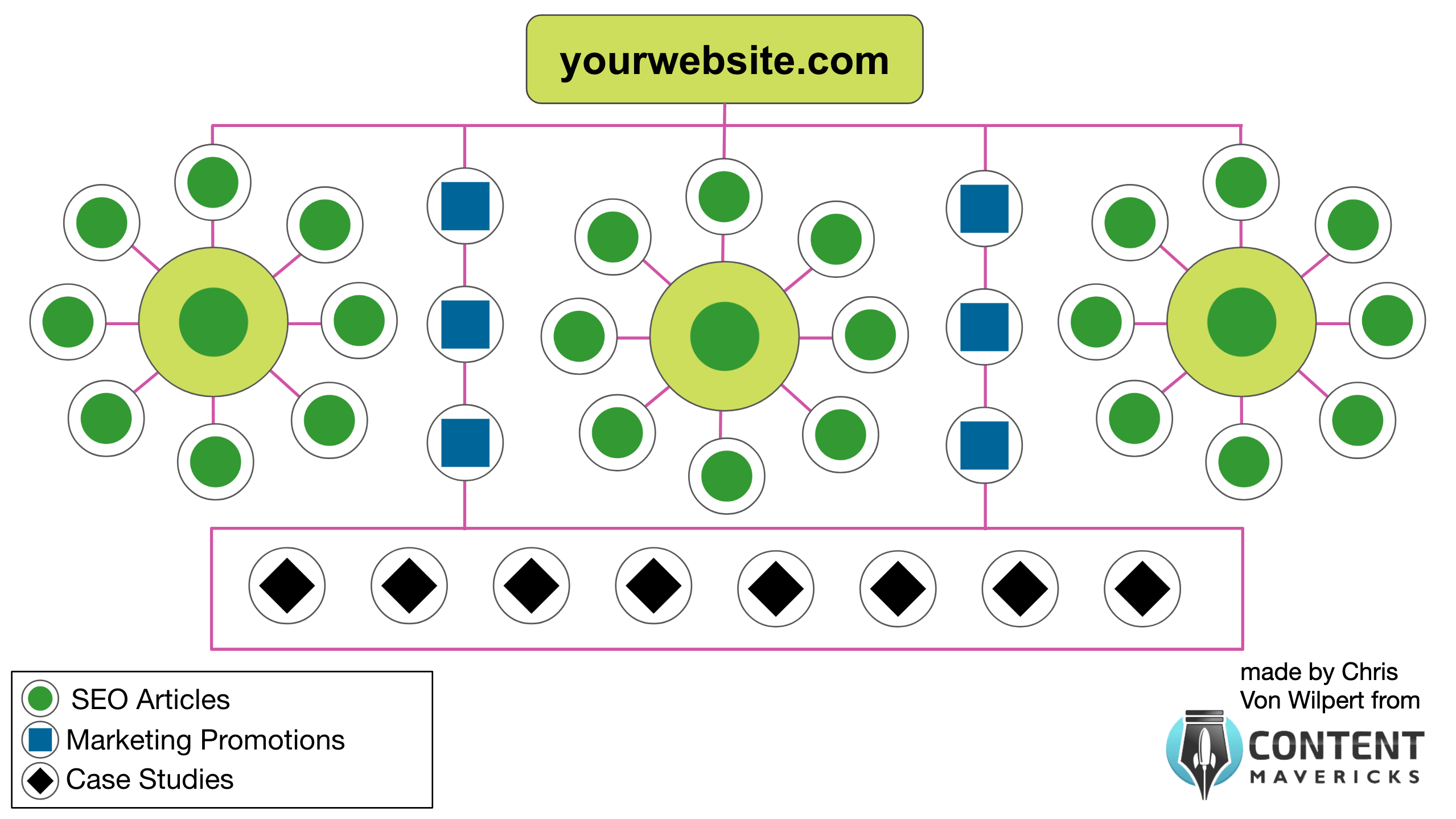
Remember: Content marketing existed BEFORE social media networks.
The Ski Slope Strategy (pictured above) is a way you can leverage social media as a tool, but not rely on it like a crutch for all your traffic needs.
What Is The Difference Between Content Marketing And SEO?
Most content marketers are obsessed with SEO (aka getting content to rank at the top of Google) and link building.
They’re what my buddy Freddie likes to call “Google’s little bitch.”
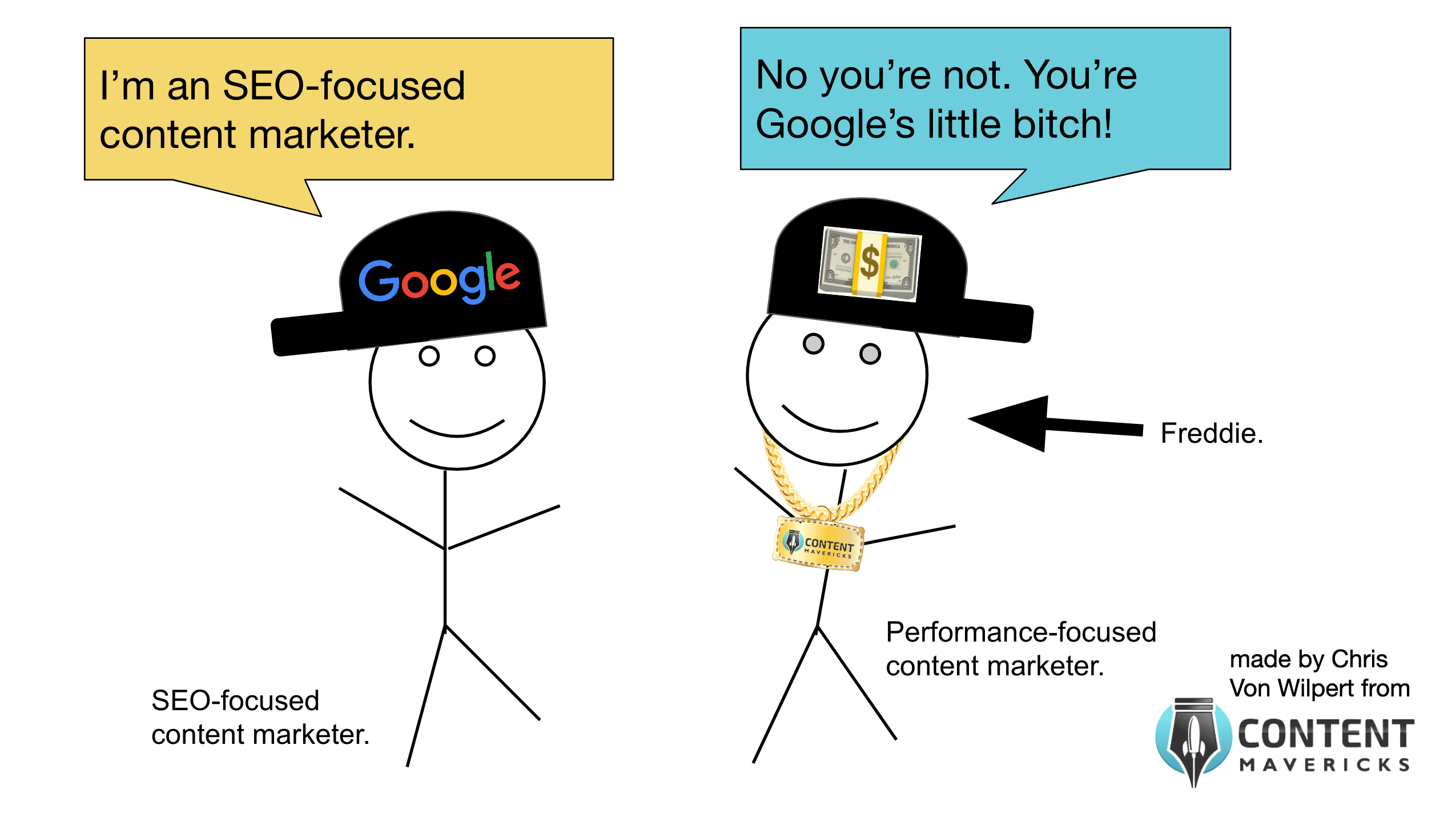
SEO is NOT controllable.
No one knows the Google algorithm. All the experts know are “SEO best practices.”
- Optimize your site (structure/speed/internal linking/etc).
- Create high-quality content.
- Build links.
The problem with this strategy?
Jumpshot data revealed less than half of all Google searches now result in a click (due to Google’s aggressive use of SERP features), like this: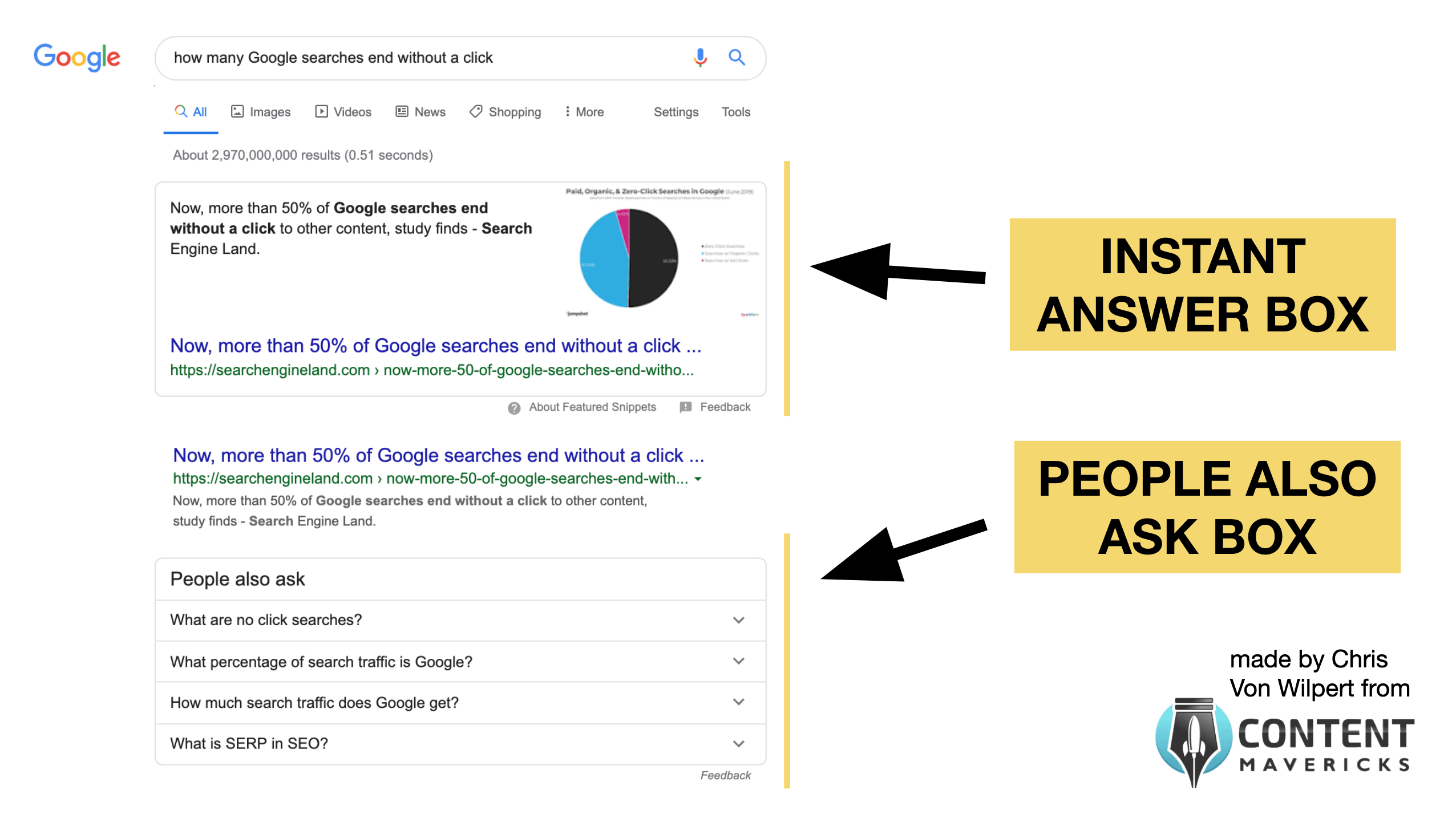
On top of that:
Every website has a different domain authority (i.e. a measure of how authoritative a site is in Google’s eyes).
And every topic has different competitors competing for it.
You can do keyword research, analyze the competition, and find topics you have a higher probability of winning for on Google.
I teach how to do it inside the Content Mavericks Greatest Hits Content Program.
However, you can’t rely on this method alone.
YOU WILL FAIL.
Especially if you have a new site, and are new to content marketing.
The better approach?
Treat SEO and organic Google traffic as a nice side-benefit of your content marketing efforts.
Build content assets that deliver a consistent flow of leads every day (even if your content doesn’t end up ranking on Google).
How?
Ask yourself WWOD: What Would Ogilvy Do?
He WOULDN’T:
- Publish a piece of content.
- Promote it everywhere like a mad man (and link build like a crazy person).
- Pray his target customers see it (and it ranks on Google).
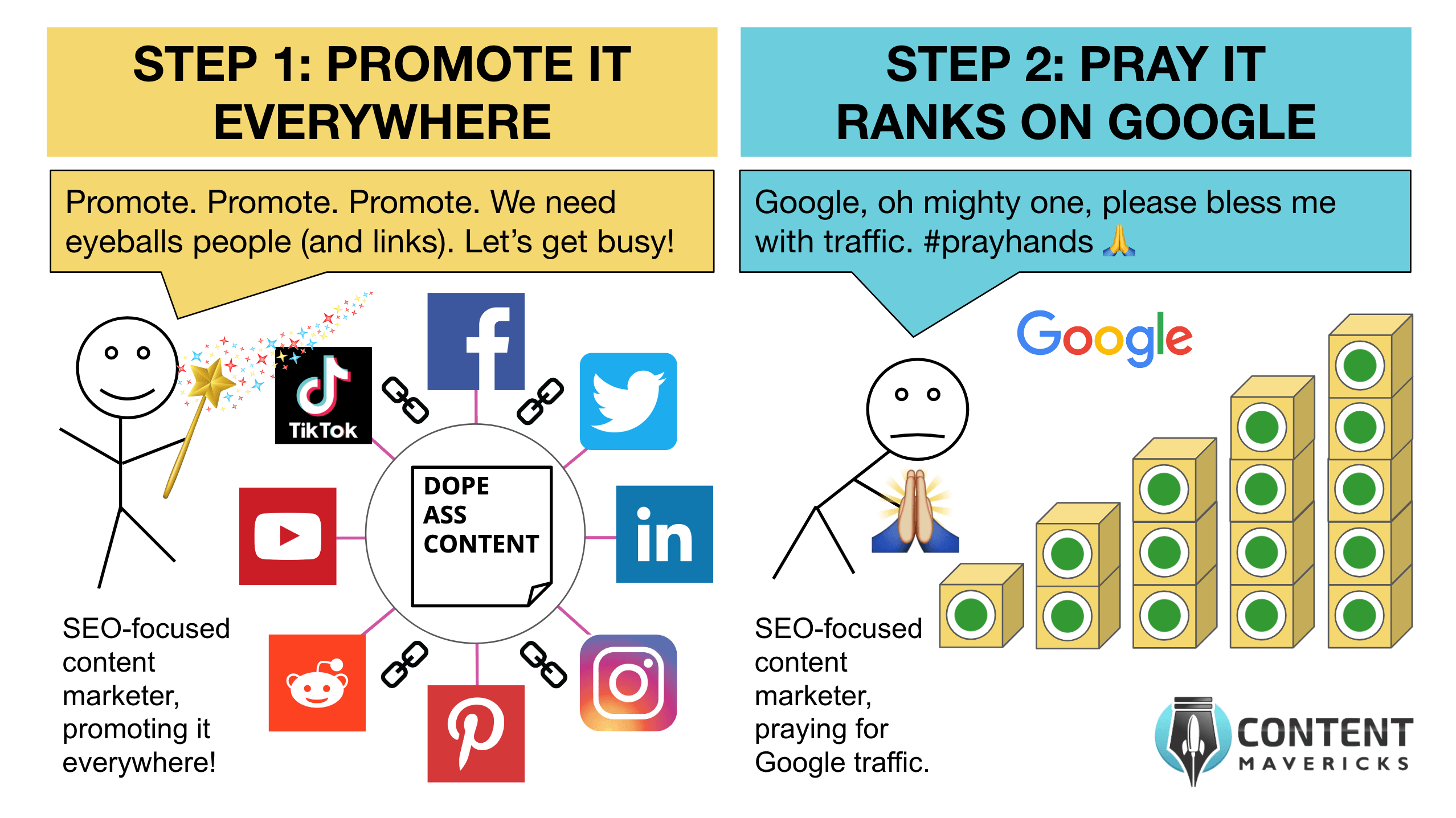
He WOULD:
- Research his ideal target customers.
- Come up with “big ideas” for content to appeal to those target customers.
- Distribute the content strategically so new target customers see it daily.
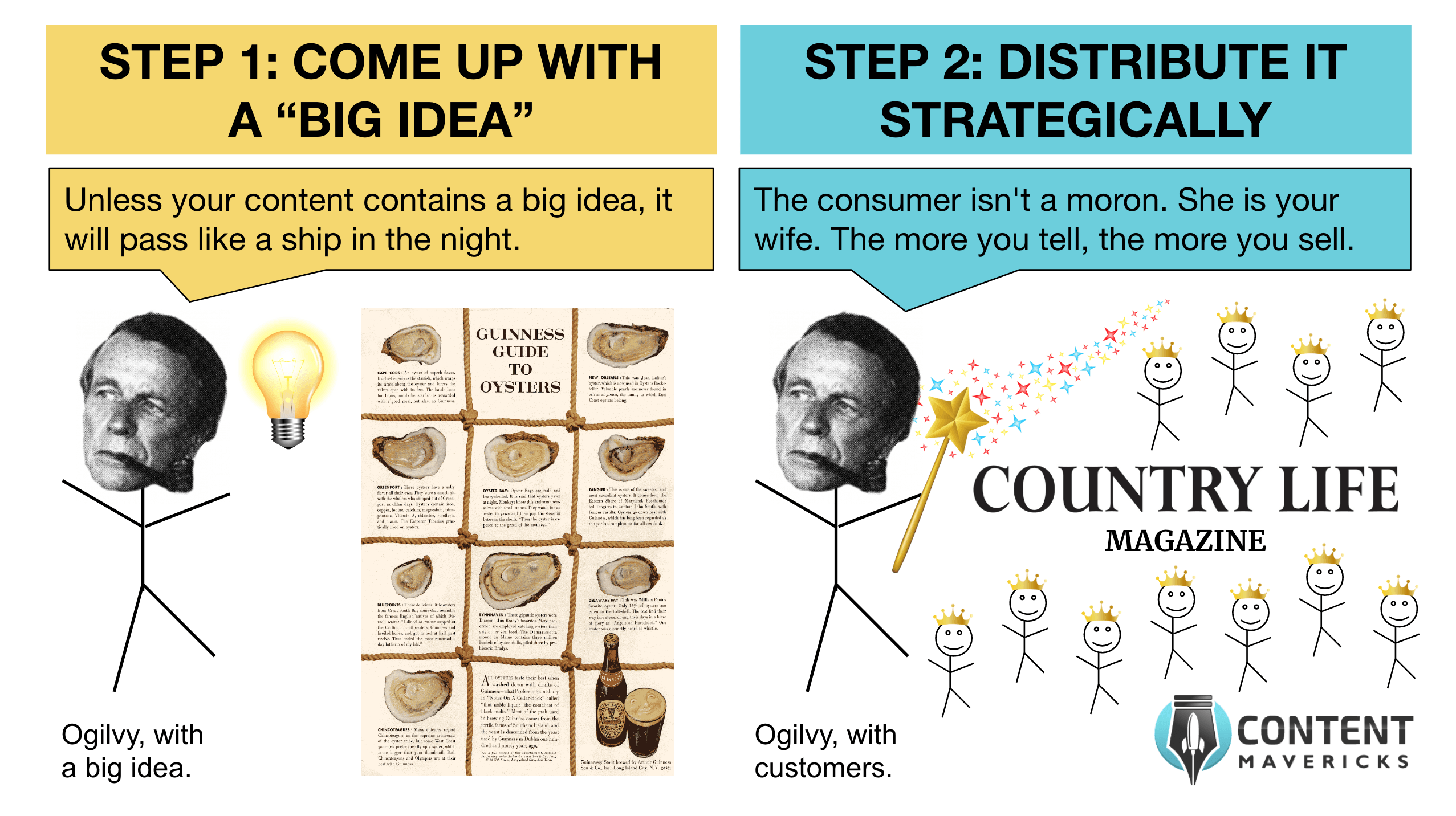
Notice: Ogilvy would not create CONSISTENT weekly content.
That would be overwhelming for him to execute.
It would lead to information overload for his customers.
Most importantly, it would take away from the time needed to focus on strategic distribution of the content.
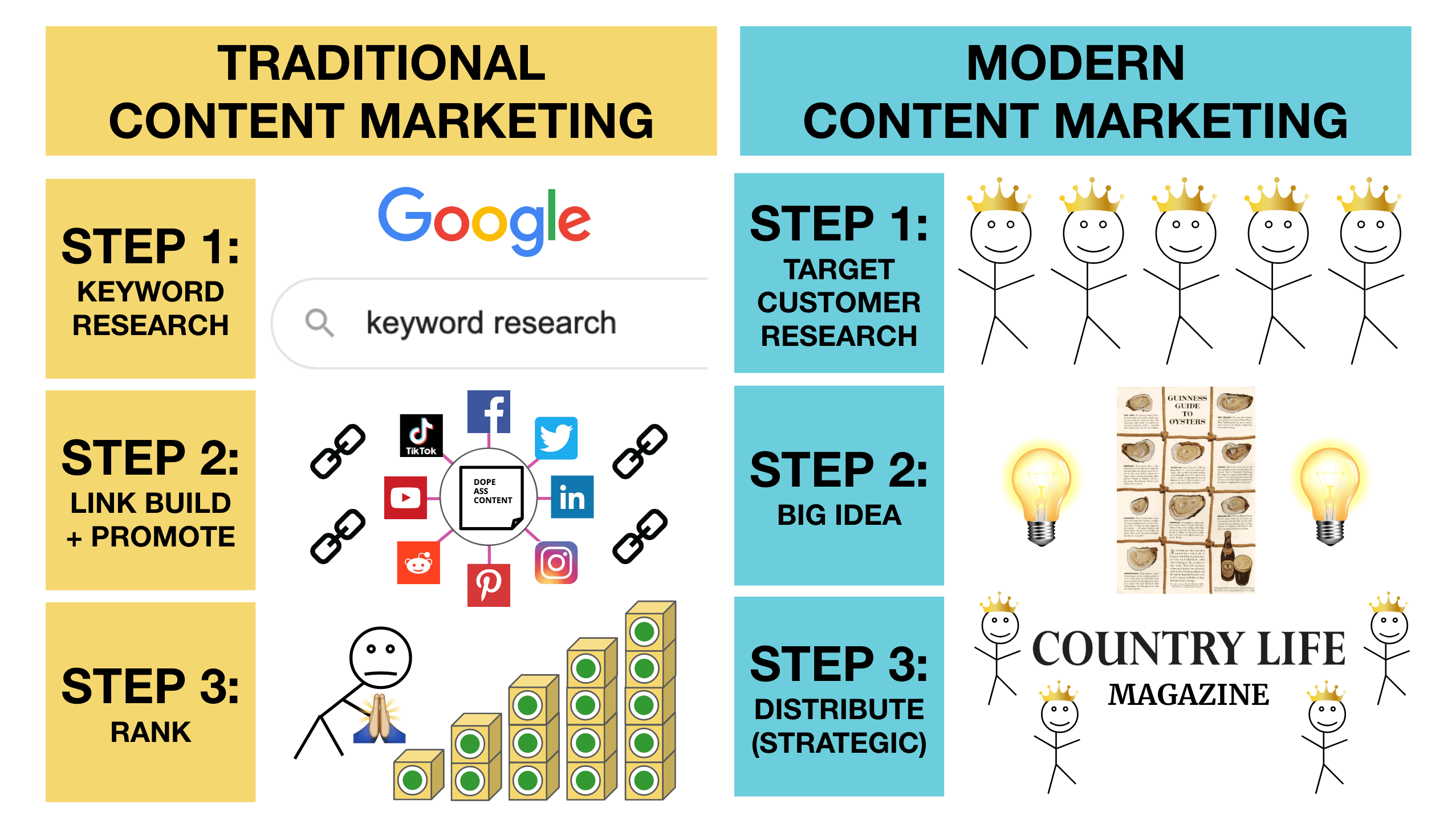
Remember: Content marketing existed BEFORE search engines and “link building.”
Chuck out the rankings report and start tracking the metrics that show your boss how your content marketing is making money.
You know… the money needed to pay you and run a profitable company 🙂
How Do I Get People To See My Content If They Can’t Find Me On Google?
In the 1950s, the internet and Google didn’t exist.
Big media companies controlled the airwaves and printing factories.
You PAID to get your content in publications your target customers read.
(Or you hired a sales team to hand out your content door-to-door, like Jell-O).
Today technology has changed the game.
Tiny pockets of people interested in specific topics now exist all over the internet.
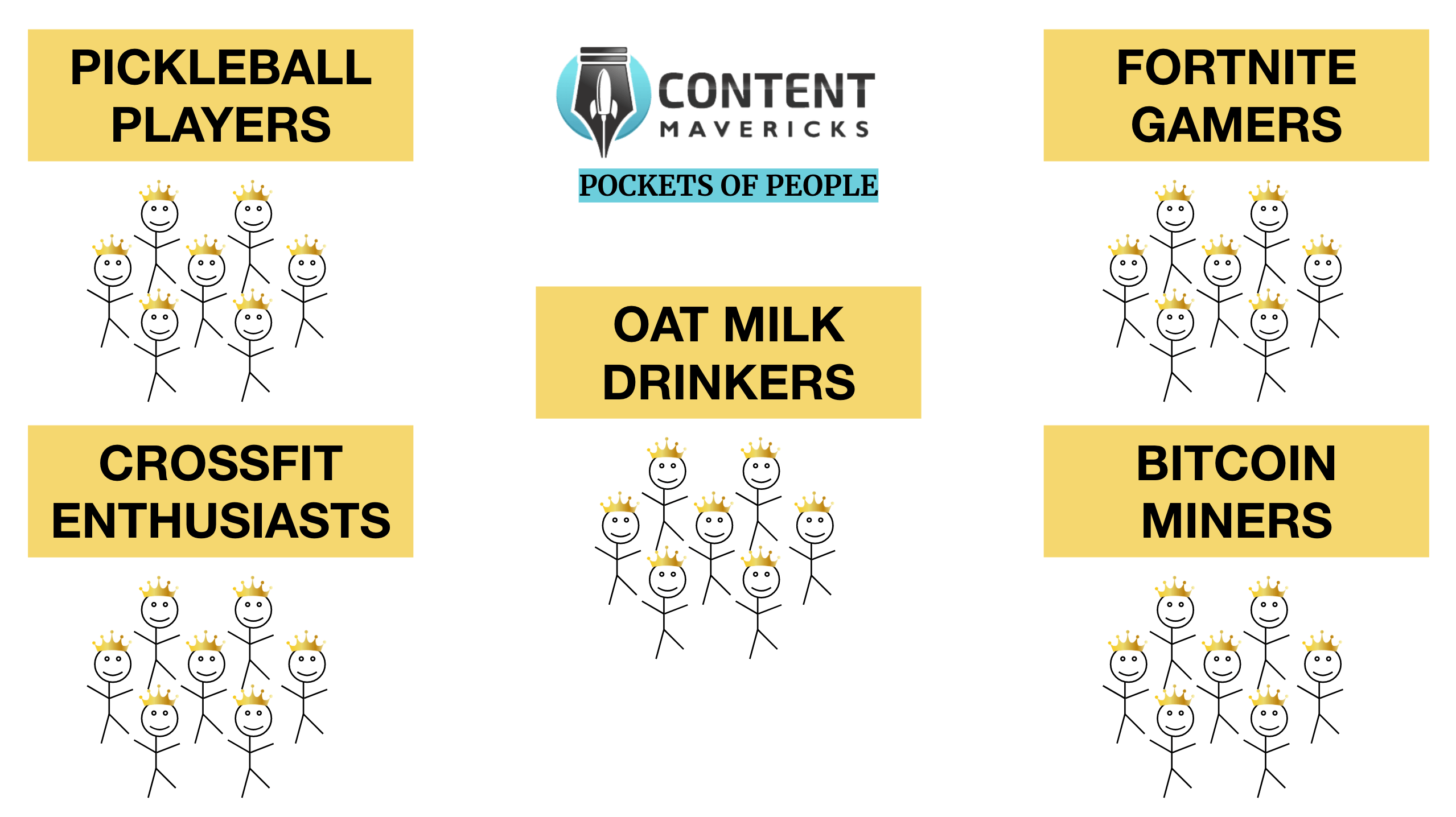
This phenomenon has opened up new content distribution channels in micro-niches all over the internet.
Your job as a content marketer is to:
- Identify who the target customer is for your content.
- Find where your target customers hang out online / who they follow.
- Figure out how to get your content in front of them.
Don’t overcomplicate it.
What I can tell you is that these tactics will not get you traffic long-term:
- Posting your content to your company’s social media accounts.
- Spamming Facebook groups and communities online.
- Sending outreach emails asking influencers to share your content.
You need to stop focusing on short-term, dopamine hits of traffic.
And start focusing on how to get long-term, steady trickles of traffic.
I teach how to do it inside the Content Mavericks Greatest Hits Content Program.
Or you can try and learn from trial and error.
When Will I Start Making Fat Wads Of Cash From My Content Marketing?
If you hire an SEO-focused content marketer, wait a year.
If you hire a performance-based content marketer, wait a week.
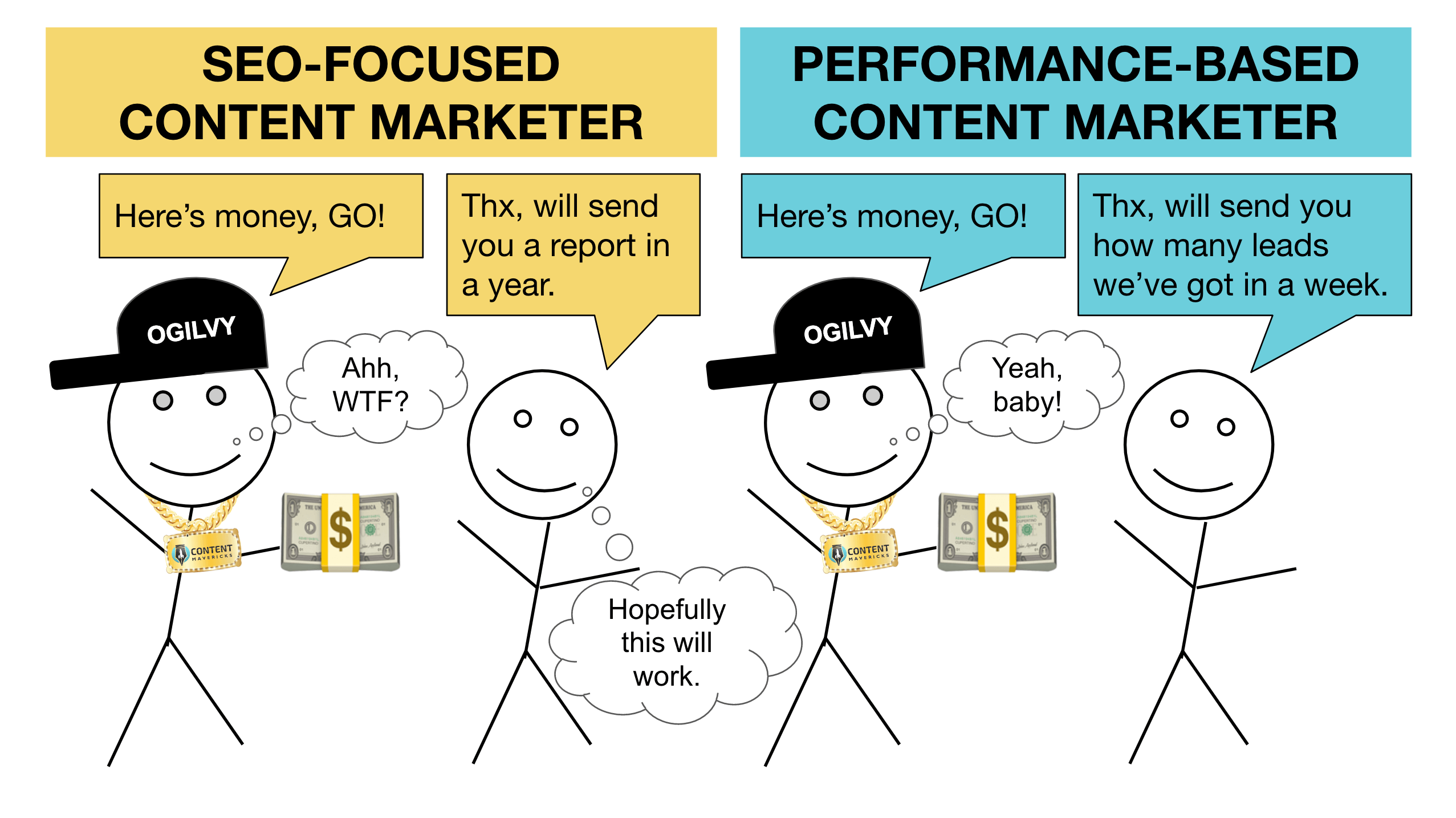
Performance-based content marketers know how to generate leads from content.
It isn’t a 5th grade jelly bean guessing game.
The performance content marketer:
- Creates content based on a “big idea” for a target customer (not Google).
- Optimizes content to convert traffic into leads and customers.
- Distributes content strategically so new people see it every day.
Ok, I’m Convinced (AF). How Do I Get Started With Content Marketing Today?
The fastest way to get better at content marketing is to get inspiration from other successful content marketers.
To do it, check out ”Behind The Content”, an hour long video I created on how some of the most creative pieces of performance-based content have come into existence.
From big brands, to agencies, to individual content creators, this video will show you 30 proven content types you can use to grow your business with content marketing today.
PS- Performance-based content marketing is what I teach at Content Mavericks. If you want to go deeper on generating daily leads and sales with content marketing, check out our products.
PPS- If you enjoyed this, let me know in the comments:
What's the “big idea” for your next piece of content?


